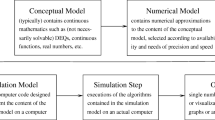Abstract
A number of recent discussions comparing computer simulation and traditional experimentation have focused on the significance of “materiality.” I challenge several claims emerging from this work and suggest that computer simulation studies are material experiments in a straightforward sense. After discussing some of the implications of this material status for the epistemology of computer simulation, I consider the extent to which materiality (in a particular sense) is important when it comes to making justified inferences about target systems on the basis of experimental results.
Similar content being viewed by others
References
Callender C., Cohen J. (2006) There is no special problem of scientific representation. Theoria 55: 67–85
Cressman G. (1996) The origin and rise of numerical weather prediction. In: Fleming J.R. (eds) Historical essays on meteorology 1919–1995.. American Meteorological Society, Boston, pp 21–39
Dowling D. (1999) Experimenting on theories. Science in Context 12(2): 261–273
Galison P. (1997) Image and logic. University of Chicago Press, Chicago
Guala F. (2002) Models, simulations, and experiments. In: Magnani L., Nersessian N. (eds) Model-based reasoning: Science, technology, values.. Kluwer, New York, pp 59–74
Guala F. (2005) The methodology of experimental economics. Cambridge University Press, Cambridge
Hacking I. (1983) Representing and intervening. Cambridge University Press, Cambridge
Hartmann S. (1996) The world as a process. In: Hegselmann R., Troitzsch K., Mueller U. (eds) Modelling and simulation in the social sciences from the philosophy of science point of view. Kluwer, Dordrecht, pp 77–100
Humphreys P. (1994) Numerical experimentation. In: Humphreys P. (eds) Patrick Suppes: Scientific philosopher Vol. 2. Kluwer, Boston, pp 103–121
Keller E.F. (2003) Models, simulation, and ‘computer experiments’. In: Radder H. (eds) The philosophy of scientific experimentation. University of Pittsburgh Press, Pittsburgh, pp 198–215
Morgan M. (2002) Model experiments and models in experiments. In: Magnani L., Nersessian N. (eds) Model-based reasoning: Science, technology, values. Kluwer, New York, pp 41–58
Morgan, M. (2003). Experiments without material intervention: Model experiments, virtual experiments and virtually experiments. In H. Radder (Ed.), The philosophy of scientific experimentation (pp. 216–235). Pittsburgh: University of Pittsburgh Press.
Morgan M. (2005) Experiments versus models: New phenomena, inference, and surprise. Journal of Economic Methodology 12(2): 317–329
Nebeker F. (1995) Calculating the weather: Meteorology in the 20th century. Academic Press, New York
Norton S., Suppe F. (2001) Why atmospheric modeling is good science. In: Miller C., Edwards P.N. (eds) Changing the atmosphere: Expert knowledge and environmental governance. MIT Press, Cambridge, pp 67–105
Oberkampf W., Trucano T., Hirsch C. (2004) Verification, validation, and predictive capability in computational engineering and physics. Applied Mechanics Reviews 57(5): 345–384
Parker W.S. (2008) Computer simulation through an error-statistical lens. Synthese 163(3): 371–384
Radder H. (1996) In and about the world: Philosophical studies of science and technology. SUNY Press, Albany
Rohrlich F. (1991) Computer simulation in the physical sciences. In: Fine A., Forbes M., Wessels L. (eds) PSA 1990 Vol. 2. East Lansing, Philosophy of Science Association, pp 507–518
Simon H. (1969) The sciences of the artificial. MIT Press, Boston
Sismondo S. (1999) Models, simulations, and their objects. Science in Context 12(2): 247–260
Tiles J.E. (1993) Experiment as intervention. British Journal for the Philosophy of Science 44(3): 463–475
Winsberg E. (1999) Sanctioning models: The epistemology of simulation. Science in Context 12(2): 275–292
Winsberg E. (2003) Simulated experiments: Methodology for a virtual world. Philosophy of Science 70: 105–125
Woodward J. (2003) Making things happen: A theory of causal explanation. Oxford University Press, Oxford
Author information
Authors and Affiliations
Corresponding author
Rights and permissions
About this article
Cite this article
Parker, W.S. Does matter really matter? Computer simulations, experiments, and materiality. Synthese 169, 483–496 (2009). https://doi.org/10.1007/s11229-008-9434-3
Received:
Revised:
Accepted:
Published:
Issue Date:
DOI: https://doi.org/10.1007/s11229-008-9434-3




